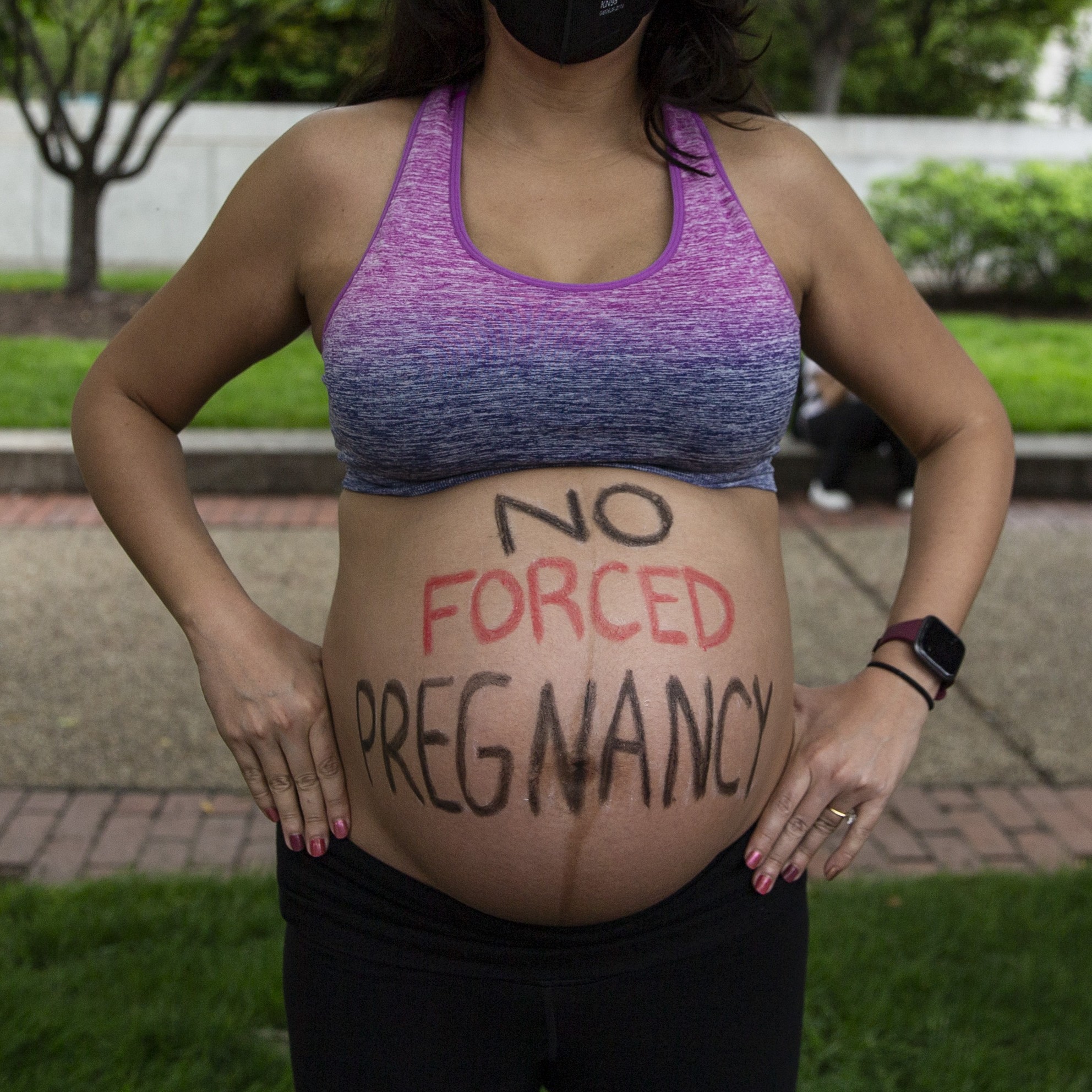Why Gretchen Whitmer's Bid for Governor Should Be Important to Every Woman
It all comes down to a law enacted in 1931.


In one of the most fierce ideological battles of the November midterm elections, Gretchen Whitmer will face off against Bill Schuette in the Michigan gubernatorial (a.k.a. governor's) race. You'd expect a Schuette victory to be bad for women in the state—just look at his troubling record during the Flint water crisis, not to mention his complete opposition to abortion—but a 1931 law on the books in Michigan could make things much, much worse for the state if the Trump-approved Schuette beat out the Obama-endorsed Whitmer, who also counts Bernie Sanders and NARAL among her endorsees.
It all comes down to an anti-choice law in Michigan enacted well before Roe v. Wade. The 1931 law states clearly that any attempt to cause an abortion, unless the mother's life is in danger, is a felony. It's known as a pre-Roe ban, which many states once had but have repealed in recent years. Michigan, along with eight other states, did not. And it didn't need to, thanks to Roe v. Wade—but if the Supreme Court ruling were ever repealed (more on that in a minute), this would be a huge problem. If Roe v. Wade were repealed, Michigan and its eight counterparts could immediately see abortion become a criminal offense—a felony, in fact.
That's a lot of "what if"s, I know. But, in truth, it's not all that unlikely that Roe v. Wade could be overturned now that Brett Kavanaugh has been confirmed as SCOTUS' newest judge. Even prior to those triggering, painful sexual assault allegation hearings, pro-choice activists were sounding the alarm about Kavanaugh, whose record indicates he would likely vote to overturn Roe if such a challenge were brought to the nation's highest court. (And you better believe that a whole bunch of anti-choice groups are trying to do just that.) Indeed, some pundits described Roe as dead the moment that Anthony Kennedy set free his SCOTUS seat.
Which brings me to Whitmer. An openly pro-choice candidate for governor, she went so far as to release a plan in July to protect abortion rights in the state if elected. (Schuette's team, on the other hand, made clear to The Detroit News that "as governor he would enforce the laws on the books, just as he does now as attorney general"—in other words, the 1931 law). While nothing would fix the damage done to the country if Roe were overturned, Whitmer as governor would at least be able to negate the damage by getting the 1931 law repealed.
As Whitmer noted in a statement to NARAL after being endorsed by the nonprofit group October: "The stakes in this election couldn’t be higher for Michigan women and families." It's politics-speak, yes, but Whitmer isn't wrong.

From explainers to essays, cheat sheets to candidate analysis, we're breaking down exactly what you need to know about this year's midterms. Visit Marie Claire's Midterms Guide for more.
RELATED STORIES



Stay In The Know
Get exclusive access to fashion and beauty trends, hot-off-the-press celebrity news, and more.

Jenny is the Digital Director at Marie Claire. A graduate of Leeds University, and a native of London, she moved to New York in 2012 to attend the Columbia University Graduate School of Journalism. She was the first intern at Bustle when it launched in 2013 and spent five years building out its news and politics department. In 2018 she joined Marie Claire, where she held the roles of Deputy Digital Editor and Director of Content Strategy before becoming Digital Director. Working closely with Marie Claire's exceptional editorial, audience, commercial, and e-commerce teams, Jenny oversees the brand's digital arm, with an emphasis on driving readership. When she isn't editing or knee-deep in Google Analytics, you can find Jenny writing about television, celebrities, her lifelong hate of umbrellas, or (most likely) her dog, Captain. In her spare time, she writes fiction: her first novel, the thriller EVERYONE WHO CAN FORGIVE ME IS DEAD, was published with Minotaur Books (UK) and Little, Brown (US) in February 2024 and became a USA Today bestseller. She has also written extensively about developmental coordination disorder, or dyspraxia, which she was diagnosed with when she was nine.
-
 Tyla's Coachella Outfit Pairs Dolce & Gabbana With Pandora
Tyla's Coachella Outfit Pairs Dolce & Gabbana With PandoraThe singer wore a gold version of the crystal bra made famous by Aaliyah.
By Amy Mackelden Published
-
 How Kate Middleton Is Influencing George's Fashion Choices
How Kate Middleton Is Influencing George's Fashion ChoicesThe future king's smart blazer is straight out of Princess Kate's style playbook.
By Amy Mackelden Published
-
 King Charles "Couldn't" Meet Prince Harry During U.K. Visit
King Charles "Couldn't" Meet Prince Harry During U.K. Visit"It could actually bring down a court case."
By Amy Mackelden Published
-
 36 Ways Women Still Aren't Equal to Men
36 Ways Women Still Aren't Equal to MenFeatures It's just one of the many ways women still aren't equal to men.
By Brooke Knappenberger Last updated
-
 How New York's First Female Governor Plans to Fight for Women If Reelected
How New York's First Female Governor Plans to Fight for Women If ReelectedKathy Hochul twice came to power because men resigned amid sexual harassment scandals. Here, how she's leading differently.
By Emily Tisch Sussman Last updated
-
 Why the 2022 Midterm Elections Are So Critical
Why the 2022 Midterm Elections Are So CriticalAs we blaze through a highly charged midterm election season, Swing Left Executive Director Yasmin Radjy highlights rising stars who are fighting for women’s rights.
By Tanya Benedicto Klich Published
-
 Tammy Duckworth: 'I’m Mad as Hell' About the Lack of Federal Action on Gun Safety
Tammy Duckworth: 'I’m Mad as Hell' About the Lack of Federal Action on Gun SafetyThe Illinois Senator won't let the memory of the Highland Park shooting just fade away.
By Sen. Tammy Duckworth Published
-
 This Bill Wants to Stop Anti-Abortion Groups From Getting Your Private Data. Period
This Bill Wants to Stop Anti-Abortion Groups From Getting Your Private Data. PeriodPost-Roe period tracking apps and search history suddenly have serious implications.
By Emily Tisch Sussman Published
-
 Post-Roe, Pregnant People Will Become Suspects
Post-Roe, Pregnant People Will Become Suspects\201cWe anticipate a very dramatic increase in the rate of criminalization of all pregnancy outcomes.\201d
By Lorena O'Neil Last updated
-
 14 Abortion Rights Organizations Accepting Donations to Support Their Fight
14 Abortion Rights Organizations Accepting Donations to Support Their FightFeatures 'Roe' is no longer the law of the land, but these organizations won't stop fighting.
By Gabrielle Ulubay Published
-
 Lawmakers, Activists, and Allies Are Reacting With Fury to 'Roe' Being Overturned
Lawmakers, Activists, and Allies Are Reacting With Fury to 'Roe' Being OverturnedThousands are taking to Twitter to express their grief and anger.
By Tanya Benedicto Klich Published